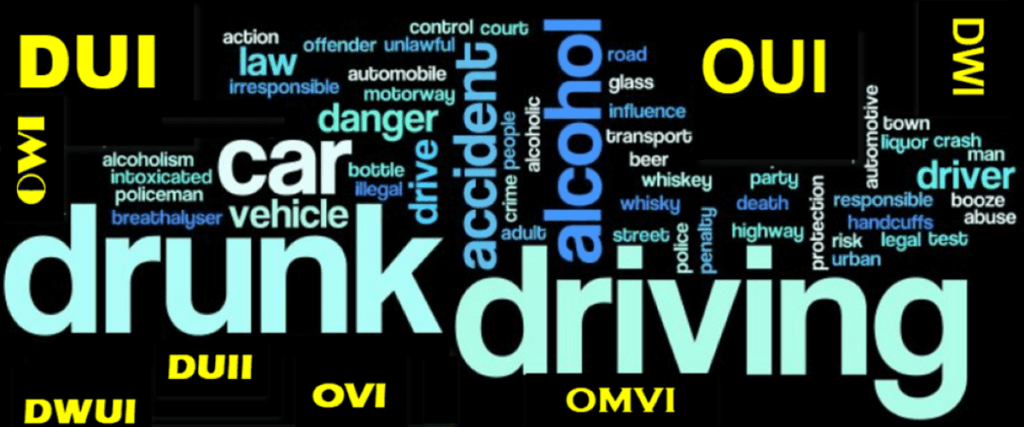The Ohio Acronym is “OVI” in Buckeye State
Because only one state (Ohio) uses the acronym “O.V.I.” many callers to Ohio criminal lawyers’ offices ask, “What does OVI stand for?” This abbreviation appears on most jail bond papers and jail inventory sheets, in Ohio.
OVI vs DUI under Ohio DUI laws. By changing the statute’s wording to “OVI”, legislators in Ohio wanted to warn citizens that their vehicles need not be moving, or even be on a public roadway, for the serious traffic crime (an OVI charge) in Ohio to be committed.
What Is The Meaning of OVI?
In Ohio, driving under the influence is referred to as “operating vehicle impaired”. By using “operating” and not just identifying “driving” the Ohio Legislature distinguished the Buckeye State’s laws for its OVI crime from other jurisdictions’ statutes. Indeed, only Ohio uses this acronym for its drunken driving or drugged driving law. Yet, the OVI defenses and tactics for winning intoxicated driving cases used in Ohio are the same as in other states for DUI defenses or DWI defenses.
Before being arrested for driving intoxicated (or impaired, these four facts were not known by the vast majority of our clients:
- Giving your name and true address is all you are required to give (or say) once confronted by police and suspected of drunken driving. No more discussion or answering questions is mandated under the United States Constitution.
- All pre-arrest roadside agility and so-called “field sobriety tests” are optional, voluntary, and are not “scientific” tests.
- Only if first arrested (cuffed) is a person arrested for an OVI in Ohio required to take a breath test, at the station.
- All breath alcohol devices used to “measure” the alcohol in your system do this by shining an infrared light through a tiny volume of your breath exhalation, to yield your numeric test results.
See this list of the possible 97 Consequences of a Drunk Driving Conviction.

Is it Worth Trying to Avoid a First OVI Conviction in Ohio?
This article explains why individuals facing an Operating a Vehicle under the Influence (OVI) charge in Ohio should always take advantage of a free first consultation with an experienced lawyer. Most crucially, once a first-offense DUI Ohio conviction gets recorded, it is there for the remainder of your life.
In the state of Ohio, some criminal accusations cannot be removed from State crime records. OVI, OMVI, DUI, OWI, OUI, and DWI are among them. Consequently, if someone has pleaded guilty, nolo contendere, or has been convicted of operating while intoxicated or impaired at trial, the person would not be able to get her, or his record cleared.
Our attorneys for an OH OVI arrest all offer a free consultation to all those charged with OVI. If indigent, our lawyers will explain how to obtain pro bono (free) criminal defense services. Call now, because on your initial consultation, we will ensure that you are advised about:
- Even on a first-time OVI, the immediate need to deal with the pending implied consent license suspension, as set forth under Ohio laws, must be handled. Plus, since this must be accomplished within thirty (30) days after the arrest date, most will need an OVI lawyer for this appeal to have a chance of being accepted.
- How (by taking the state’s post-arrest testing), an unlawful blood alcohol concentration (BAC), or a breath alcohol test or urine tests yielding results over the applicable legal limit can support a conviction, whether you were impaired when arrested or not.
- A driver who has had their license suspended after refusing to take a chemical test is allowed to appeal the suspension within thirty days after the arrest. The driver must request, in writing, an Administrative License Suspension Hearing with the Ohio Bureau of Motor Vehicles, and file it with the municipal or county court where the arrest occurred.
After the BMV hearing request is made, the driver will receive notice of when and where the hearing will take place. If the hearing is granted, the driver will be able to attend the hearing and do so with her or his lawyer being present, too.



Variations of Other Abbreviations Used for OVI in Ohio
So, in the State of Ohio, the offense of driving while under the influence of alcohol or drugs has many different names, but the official term is Operating a Vehicle Impaired (OVI). Other names for this crime include Driving Under the Influence (DUI), Driving While Impaired (DWI), driving with an unlawful blood alcohol level (DUBAL), and an O.M.V.I. charge Ohio for
operating a motor vehicle impaired (OMVI).
DUI-DWI dominates as the impaired driving acronym. The prevailing, most common acronym, nationally, is “DUI” for “driving under the influence” of alcohol or drugs. After DUI charges, the second most common abbreviation is “D.W.I” which can mean driving while intoxicated (as in Texas) or driving while impaired, such as in North Carolina.
Examples of Federal and State Decisional Law that Controls Legal Issues in OVI Cases
The Ohio implied consent law is similar to other states’ laws on the same legal issue. Intoxicated driving laws in Ohio provide that a person who operates a motor vehicle in the State and who is reasonably suspected (by a law enforcement officer) of committing an OVI offense — once arrested — can be asked to take a forensic test. The legal fiction is that by electing to use Ohio’s roadways, that arrested driver impliedly agrees to consent to a chemical test of their breath, blood urine, saliva, etc., for purposes of disclosing impairing substances in that person’s system.
Plus, the U.S. Supreme Court in 2019 ruled in a similar Wisconsin appeal that an unconscious or deceased person (by being unable to consent) creates an “exigent” circumstance authorizing the State to collect a forensic sample, without consent. Mitchell v. Wisconsin, 588 U.S. ___, 139 S. Ct. 2525 (2019)
In a 2020 case, the United States Constitution’s 4th Amendment was raised in a pre-trial motion to suppress, due to the officer not seeing a legitimate traffic violation. State v. Turner, 163 Ohio St. 3d 421, 170 N.E.3d 842 (2020), the Ohio Supreme Court overturned an Ohio Court of Appeals ruling upholding a State Highway Patrol trooper pullover of a vehicle by activating emergency lights. The basis for the traffic stop was a lane violation.
The State’s highest court ruled that the conviction must be overturned since no traffic violation occurred. Turner, the driver whose right-side tires were straddling the painted, white line along the right edge of the highway, never went off the road, nor did the tires cross that white line. After this appellate victory in Ohio’s highest court, the conviction was overturned and vacated (removed from all records) since the conviction cannot stand when an illegal pullover is how the case started.
See this page for a list of the many types of defenses or court strategies used to win Ohio OVI cases.
Obtain a Free Lawyer Consultation from an OVI Attorney in Ohio
When you need seasoned professionals from Ohio OVI law firm to review your case, this website connects you to vetted professionals in Ohio. For this initial consultation, there is no cost to talk to a lawyer skilled in OVI defense, so what are you waiting for?
More Ohio OVI Resources
If you need an OVI lawyer in Ohio, we can help you find OVI lawyers in cities across the state of Ohio. Read our helpful and informative articles below to find an OVI lawyer near you. Also, you can call 1-888-839-4384 anytime to schedule a free consultation.

